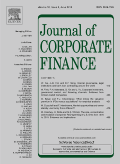
JOURNAL OF CORPORATE FINANCE
Scope & Guideline
Elevating Knowledge in Corporate Finance and Economics
Introduction
Aims and Scopes
- Corporate Governance and Management:
The journal frequently publishes research on corporate governance structures, board dynamics, and management practices, examining how these factors influence firm performance and shareholder value. - Financial Markets and Investment Strategies:
Research on financial markets, investment strategies, and their implications for corporate behavior is a core focus. This includes studies on IPOs, mergers and acquisitions, and the impact of financial regulations. - Risk Management and Financial Policy:
The journal addresses issues of risk management, corporate financial policy, and the implications of various financing choices, including debt and equity structures. - Environmental, Social, and Governance (ESG) Factors:
Recent publications indicate a growing emphasis on the role of ESG factors in corporate finance decisions, reflecting the increasing importance of sustainability and social responsibility. - Behavioral Aspects of Finance:
Behavioral finance is another key area, exploring how psychological factors and biases influence financial decision-making among managers and investors. - International Finance and Economic Policy:
The journal also covers international finance topics, including the effects of global economic policies and political variables on corporate finance decisions.
Trending and Emerging
- Impact of Digitalization on Corporate Finance:
Recent studies explore how digitalization and technological advancements affect corporate performance, investment strategies, and risk management, especially in the context of the COVID-19 pandemic. - Integration of ESG Factors:
There is an increasing emphasis on the integration of environmental, social, and governance (ESG) factors into corporate finance decisions, reflecting a broader societal shift towards sustainability. - Behavioral Finance and Investor Psychology:
Research focusing on behavioral finance, including the psychological aspects of investor behavior and decision-making, has gained prominence as researchers seek to understand market dynamics better. - Corporate Responses to Political and Economic Uncertainty:
Emerging themes include how firms navigate political risk and economic uncertainty, particularly in light of recent global events, which has led to a reevaluation of risk management strategies. - Corporate Social Responsibility (CSR) Initiatives:
The journal is witnessing a trend towards exploring the financial implications of CSR initiatives, with studies assessing how these efforts impact firm value and stakeholder relationships.
Declining or Waning
- Traditional Capital Structure Theories:
Research focusing strictly on classical capital structure theories has become less common, as newer models and frameworks that incorporate behavioral and market dynamics gain traction. - Conventional Risk Assessment Models:
Studies using traditional risk assessment models without integrating newer methodologies or real-world complexities have seen a decline, as the field moves towards more nuanced approaches. - Static Financial Reporting Practices:
The focus on static financial reporting practices has waned, with more emphasis now placed on dynamic reporting and the real-time implications of financial decisions. - Basic Shareholder Value Maximization:
Research purely centered on shareholder value maximization, without considering broader stakeholder impacts or ESG factors, appears to be declining in favor of more holistic approaches.
Similar Journals
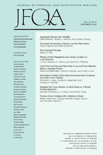
JOURNAL OF FINANCIAL AND QUANTITATIVE ANALYSIS
Fostering Rigorous Discussions in Finance and EconomicsJOURNAL OF FINANCIAL AND QUANTITATIVE ANALYSIS, published by Cambridge University Press, is a premier peer-reviewed journal that has been at the forefront of the finance and economics fields since its inception in 1966. With a notable impact factor reflecting its Q1 status in Accounting, Economics and Econometrics, and Finance for 2023, the journal is recognized for its substantial contributions to both theoretical and empirical research. Researchers and practitioners alike benefit from its comprehensive scope, addressing critical issues in financial analysis and quantitative methods. Although the journal does not currently offer open access, it remains widely accessible through institutional subscriptions. The editorial team is committed to fostering rigorous academic discussions that shape the future of finance and economics, making it an essential resource for academics, students, and industry professionals seeking to deepen their understanding of these vital disciplines. For more than five decades, this journal has continued to be an indispensable platform for disseminating influential research, thus solidifying its role as an essential cornerstone in the financial and quantitative analysis community.
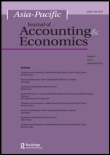
Asia-Pacific Journal of Accounting & Economics
Exploring the complexities of finance in a dynamic region.Asia-Pacific Journal of Accounting & Economics, published by Routledge Journals, Taylor & Francis Ltd, is a prestigious platform dedicated to advancing scholarly research in the fields of accounting, economics, and finance. Established in 2000 and converging its academic rigor through 2024, this journal serves as an essential resource for researchers, professionals, and students seeking to explore the interconnections and complexities within these disciplines. With a notable impact reflected in its Q3 rankings in Accounting, Economics, and Finance, the journal showcases the latest empirical research and theoretical advancements. Although it operates under a traditional access model, its commitment to quality and relevance in the Asia-Pacific region continues to make it a vital publication for those aiming to contribute to the understanding of economic dynamics and financial practices. Researchers and professionals are encouraged to engage with the articles herein to stay abreast of new insights and methodologies shaping the landscape of accounting and economics.

Journal of Multinational Financial Management
Unveiling the Complexities of Multinational CorporationsThe Journal of Multinational Financial Management, published by Elsevier, stands at the forefront of research in the fields of economics and finance, with a notable impact factor that underscores its significance in both academia and industry. With an ISSN of 1042-444X and E-ISSN of 1873-1309, this esteemed journal operates out of the Netherlands, specifically from its address at RADARWEG 29, 1043 NX AMSTERDAM. It has earned commendable rankings, including Q2 in Economics and Econometrics and Q1 in Finance for 2023, solidifying its reputation as a vital resource for researchers, professionals, and students interested in global financial management and the intricate dynamics of multinational corporations. Covering a wide scope of relevant topics from 1997 to 2024, the journal strives to foster advancements in financial theories and practices. While currently not an open access journal, it remains a critical repository for scholars aiming to explore and publish their work within a peer-reviewed platform that continues to make substantial contributions to the discipline.

Pacific-Basin Finance Journal
Advancing Knowledge in Pacific Finance and EconomicsPacific-Basin Finance Journal is a prestigious academic journal that focuses on critical developments and innovative research within the fields of finance and economics, specifically tailored to the Pacific region's unique economic landscape. Published by Elsevier, the journal boasts an impressive impact factor and is categorized in the Q1 quartile for both Economics and Econometrics and Finance as of 2023. This indicates its high relevance and position among the top journals in its field, with Scopus rankings reflecting a strong standing in the competitive landscape of finance research, holding the 45th position out of 317 in Finance and the 108th in Econometrics. Established in 1993, the journal is committed to disseminating rigorous theoretical and empirical research findings that enhance the understanding of financial systems in the Pacific Basin. Although the journal is not open access, it provides invaluable insights and comprehensive studies aimed at professionals, researchers, and students alike, fostering a deeper comprehension of the region's economic dynamics and global interconnectedness.
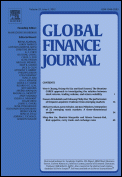
Global Finance Journal
Elevating discourse in finance and economics.Global Finance Journal is an esteemed periodical published by Elsevier, dedicated to the dynamic fields of finance and economics. With an impressive history spanning from 1989 to 2024, this journal holds a significant position in the academic community, boasting a Q1 quartile ranking in both Economics and Econometrics, as well as Finance, as of 2023. It is highly regarded in Scopus rankings, placing 40th out of 317 in Finance and 99th out of 716 in Economics and Econometrics, demonstrating its influence and reach among researchers and practitioners alike. Although not an open-access journal, the Global Finance Journal provides rigorous peer-reviewed articles that explore critical issues, advance theoretical frameworks, and address practical applications in global finance. As such, it serves as a vital resource for researchers, financial professionals, and students aiming to deepen their understanding of economic phenomena and contribute to the ongoing discourse in these vibrant disciplines.
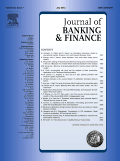
JOURNAL OF BANKING & FINANCE
Advancing the Frontiers of Financial KnowledgeWelcome to the Journal of Banking & Finance, a premier publication in the fields of finance and economics, expertly published by Elsevier. With its esteemed Q1 ranking in both the Economics and Econometrics and Finance categories for 2023, this journal frequently garners significant attention from researchers, professionals, and academics alike. Established in 1977, it has become a crucial resource for the latest research and advancements in banking and financial services, influencing policies and practices on a global scale. The journal's commitment to high-quality, peer-reviewed content ensures that it not only contributes to academic discourse but also drives real-world financial innovation. As part of the respected Elsevier publishing collection, the journal's rigorous standards and comprehensive analysis serve as indispensable tools for those seeking to understand and navigate the complexities of the financial landscape. Located in the Netherlands, the Journal of Banking & Finance continues to play a vital role in shaping the future of financial research through its impactful insights and research contributions.
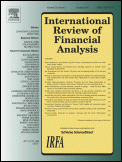
International Review of Financial Analysis
Pioneering high-impact research in finance and economics.The International Review of Financial Analysis, published by Elsevier Science Inc, is a premier journal dedicated to advancing the fields of finance and economics. With an impressive impact factor and ranked in the top quartile (Q1) of both Economics and Econometrics and Finance categories, this journal is recognized for its high-quality research and significant contributions to the discipline. Since its inception in 1992, it has provided a platform for scholars to present innovative theories and empirical studies that address critical financial issues around the globe, making it a vital resource for researchers, professionals, and students alike. Although it does not offer open access, the journal actively engages with contemporary debates in financial analysis, ultimately empowering its readership to contribute to and benefit from the ongoing discourse. With its convergence of financial research and analytical methodologies through 2024, the International Review of Financial Analysis remains a cornerstone in the pursuit of knowledge within the ever-evolving landscape of finance.
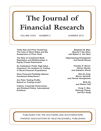
JOURNAL OF FINANCIAL RESEARCH
Navigating the Complexities of FinanceThe JOURNAL OF FINANCIAL RESEARCH, published by WILEY, stands as a pivotal platform for disseminating innovative research in the fields of finance and accounting since its inception in 1978. With an ISSN of 0270-2592 and an E-ISSN of 1475-6803, this journal aims to address contemporary challenges and trends within the financial research landscape. It has achieved notable recognition, being placed in the Q2 category for both Finance and Accounting in the 2023 rankings, signifying its relevance and impact within the academic community. Although it does not currently offer open access, the journal is accessible through various academic databases, catering to a diverse audience of researchers, professionals, and students keen on advancing their knowledge and understanding of financial systems and methodologies. With an evolving scope that encompasses empirical studies, theoretical frameworks, and practical applications, the JOURNAL OF FINANCIAL RESEARCH is committed to contributing valuable insights into the complexities of financial practices and policies.
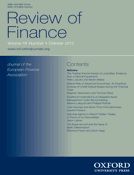
Review of Finance
Pioneering high-quality research in finance and beyond.The Review of Finance, published by Oxford University Press, stands as a premier academic journal in the fields of Finance, Accounting, and Economics. With an ISSN of 1572-3097 and an impressive track record stretching from 2001 to 2024, this journal is consistently recognized for its high-quality research, reflected in its Q1 rankings across key categories, including Accounting, Finance, and Economics and Econometrics. The Review of Finance is dedicated to advancing the understanding of financial phenomena through robust empirical and theoretical insights, making it an essential resource for researchers and professionals alike. Additionally, its strong Scopus rankings, placing it in the top percentiles, highlight its influence and relevance in ongoing academic discourse. Although the journal is not open access, it remains widely accessible through academic institutions, ensuring that its valuable contributions reach an extensive audience. The editorial board invites submissions that promise to further engage the academic community in the dynamic intersections of finance, accounting, and economic research.
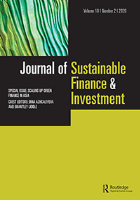
Journal of Sustainable Finance & Investment
Empowering Research at the Intersection of Finance and SustainabilityThe Journal of Sustainable Finance & Investment, published by Routledge Journals, Taylor & Francis Ltd, stands as a premier academic platform dedicated to advancing research in sustainable finance and investment practices. With an ISSN of 2043-0795 and E-ISSN of 2043-0809, this journal has carved out a significant niche in the landscape of interdisciplinary finance studies since its inception in 2011. Located in the United Kingdom, it is distinguished by its impressive quartile ranking of Q1 across prominent categories, including Business and International Management, Economics, Econometrics and Finance, and Finance. The journal boasts an exceptional Scopus rank, sitting in the top-tier percentile in multiple fields, underscoring its rigorous academic standards and the impact of its published research. Aimed at researchers, professionals, and students passionate about finance's role in promoting sustainability, the journal prioritizes innovative studies that interface financial systems with social and environmental imperatives. Although it currently does not offer Open Access, it remains a crucial resource for accessing cutting-edge insights and shaping sustainable investment practices globally.